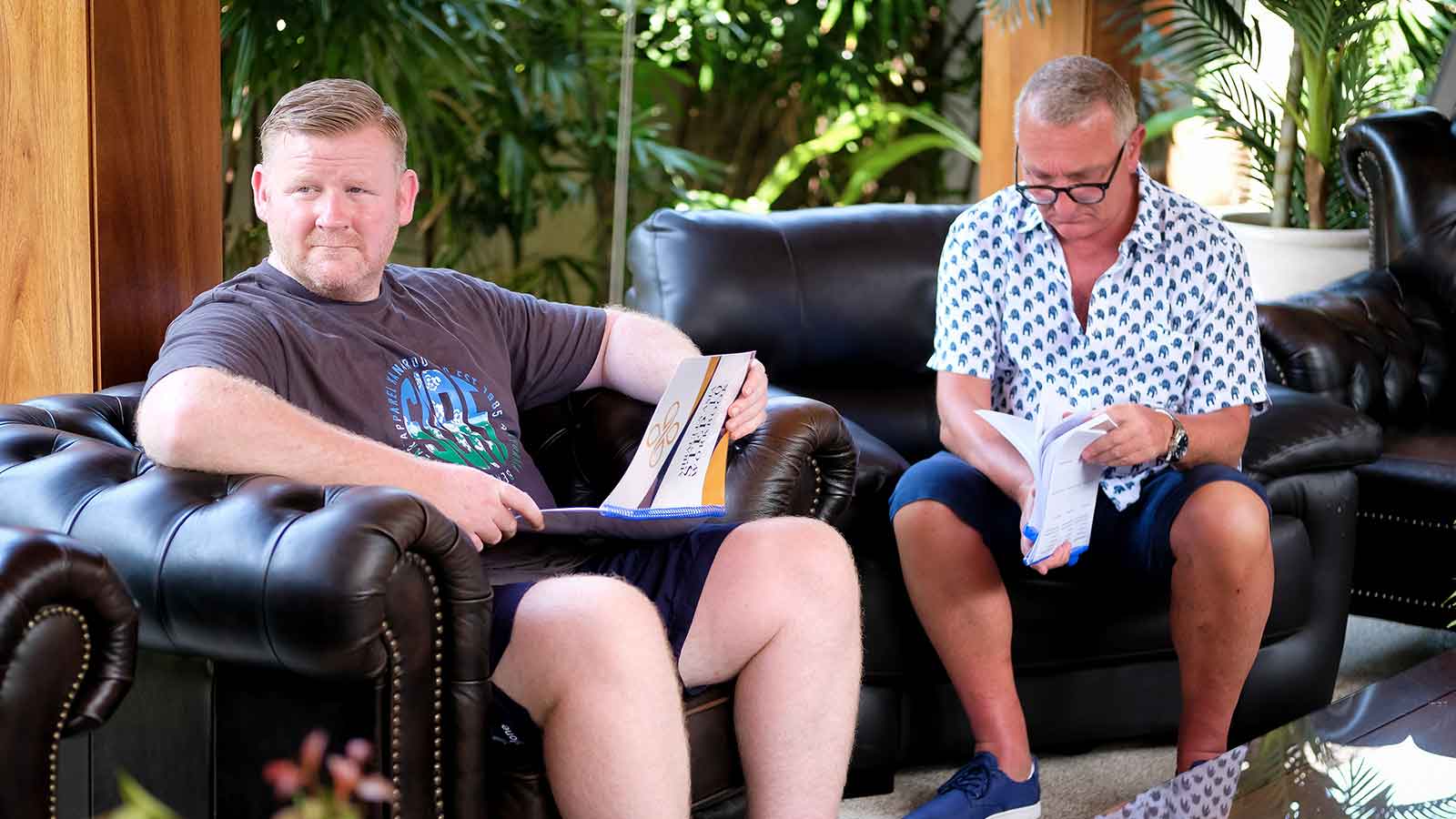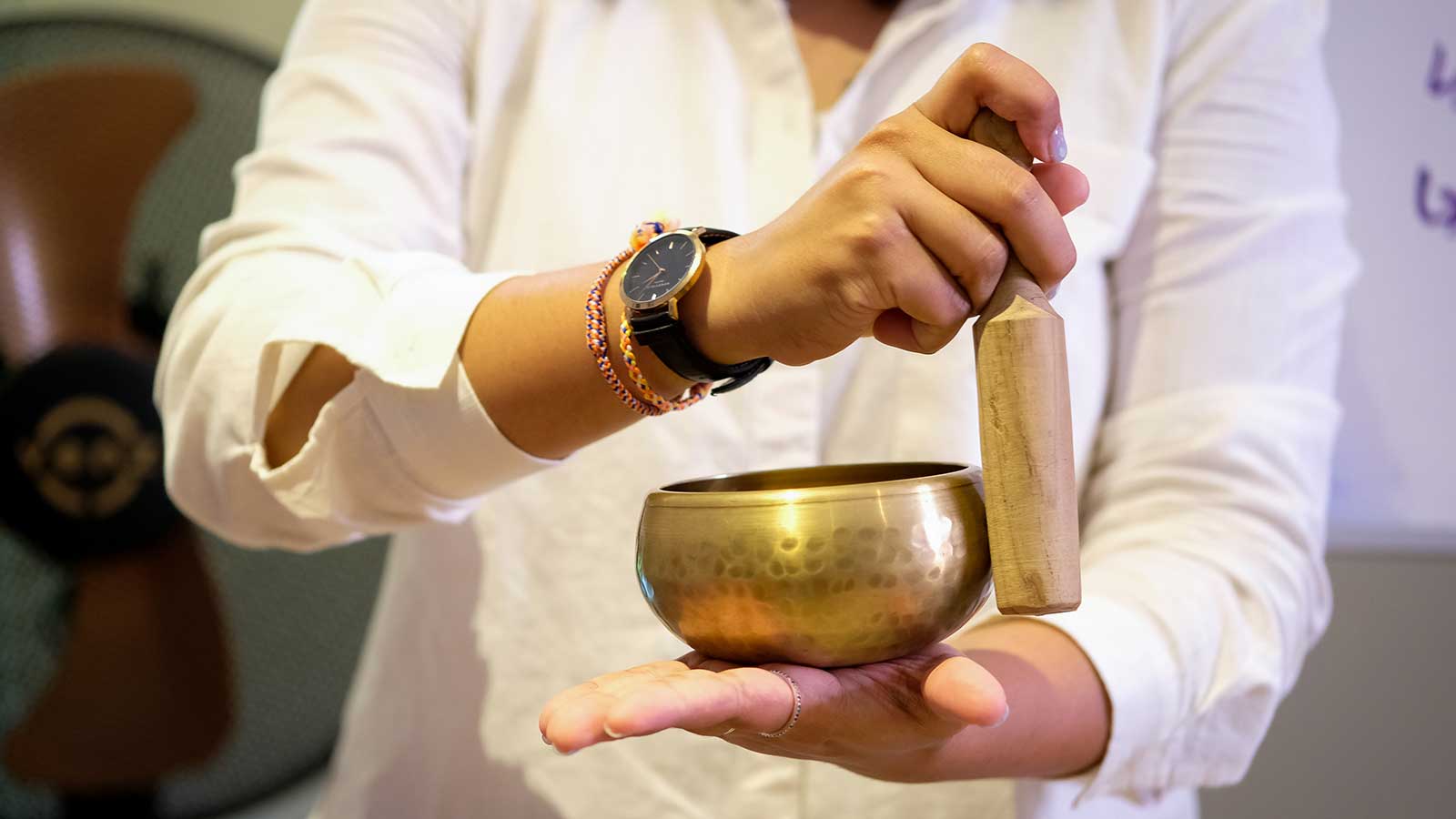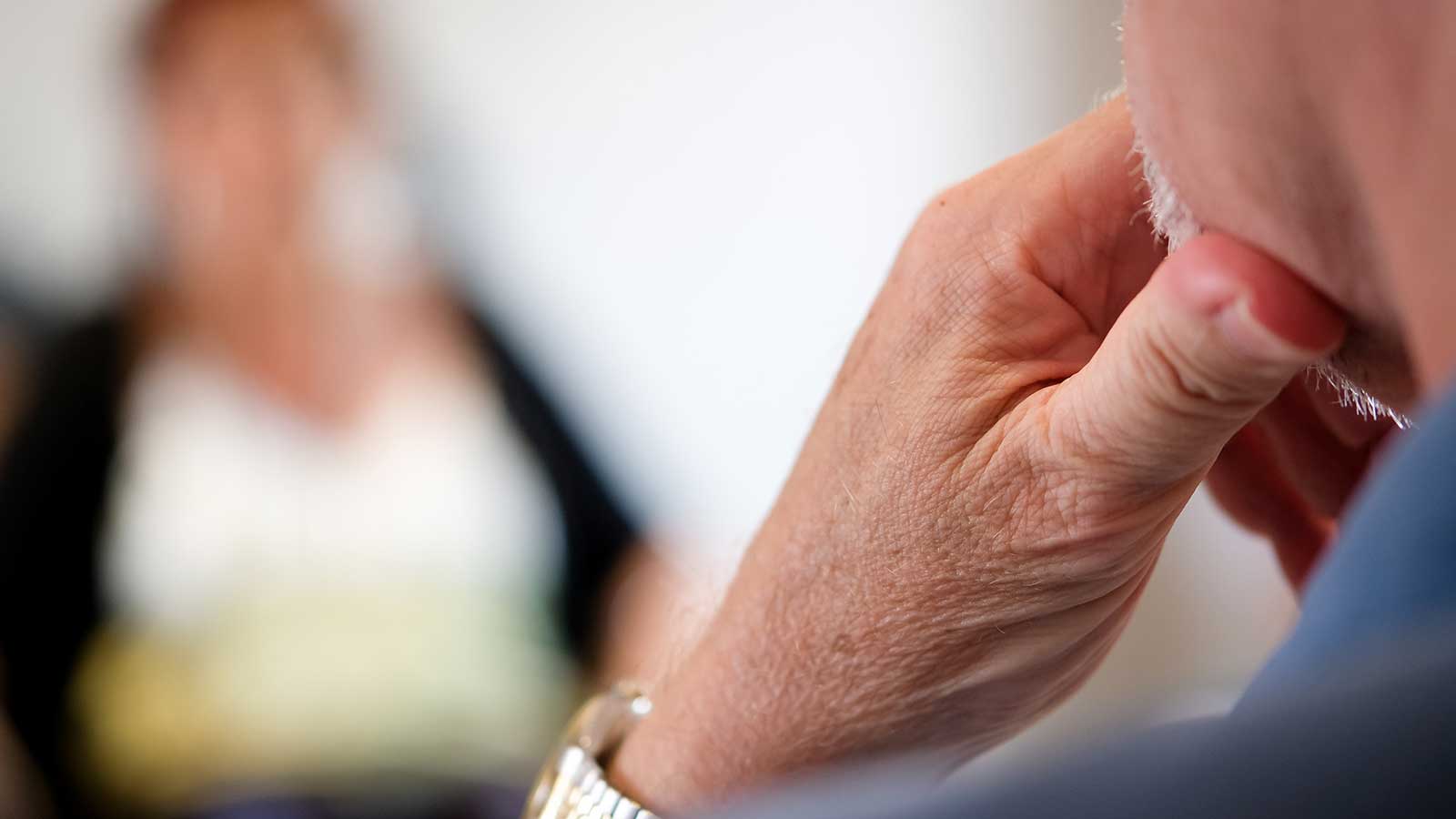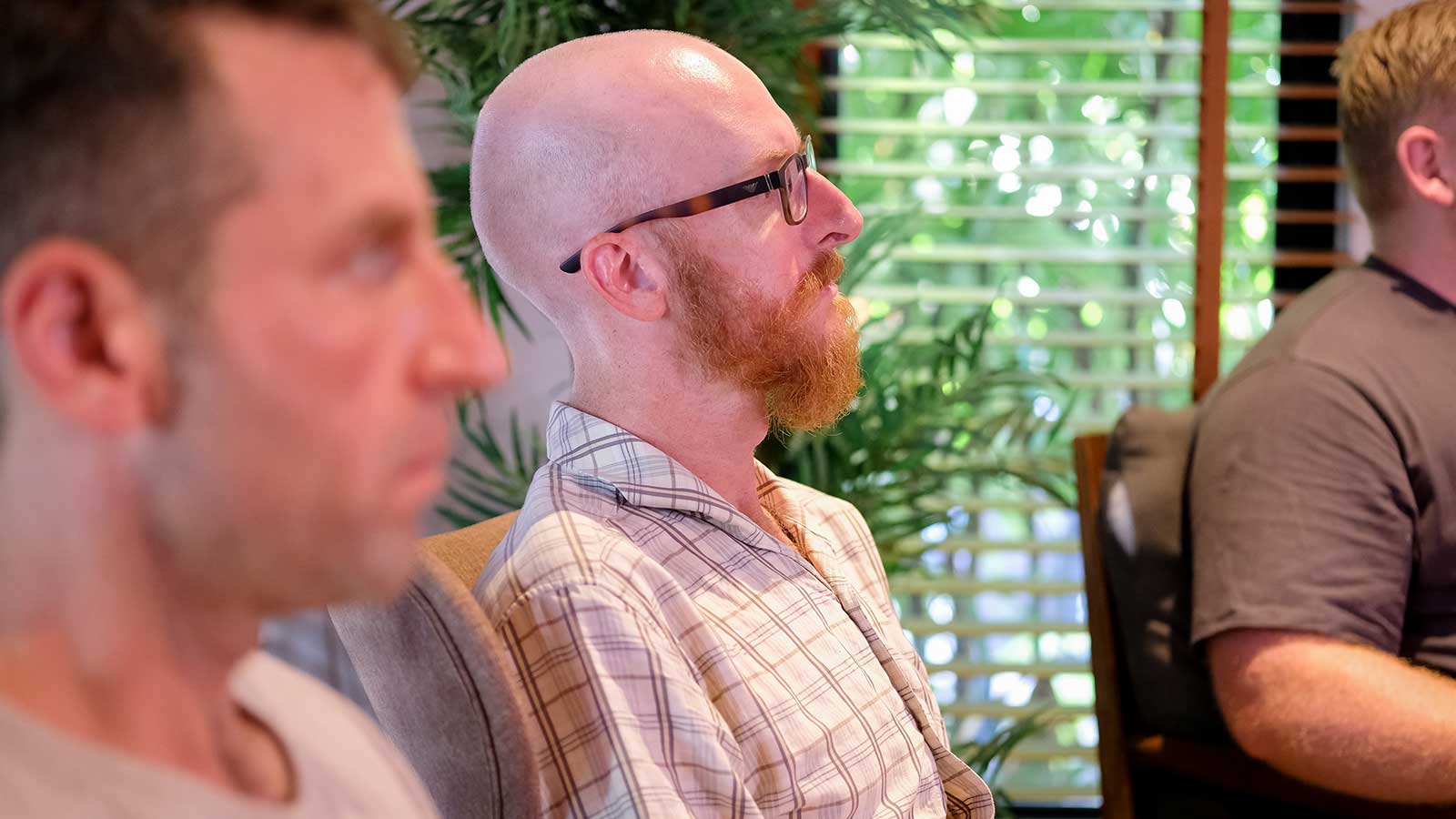
Mika
"My time at Miracles gave me a new, sober perspective on life. The superb facilities, the caring staff and the overall experience enriched my world and made me reevaluate my values and way of living.
Becoming clean is not an easy path, but Miracles made it a lot smoother. The excursions, the classes and meeting new people from all over the globe caused me to appreciate things more deeply.
I am extremely grateful for Mark, Boo and the entire teams support during my journey.
Highly recommended for addicts who are determined to choose a healthy path."
Saggar
"By a stroke of luck I ended up in Miracles. It took me a few days to come out of my haze and realise that Miracles is in a class of its own. I cannot stress enough the difference between Miracles and other facilities.
It all began with Mark, the managing director, picking me up from the airport after arranging a VIP fast track through immigration. When I got to my room I found that it was a private room, all the programme material neatly laid out on my desk, a massive bed, a TV and I was allowed to keep all my devices.
The entire programme is holistic and so well integrated with real professionals that care.
From the theory class sessions that carry practical tools, to the therapy sessions, to sessions with the recovery specialist Danny; all knowledge and awareness ties well into a complete personal programme allowing one to lay a solid foundation to recovery.
Every portion of the programme has a significant purpose. Every Sunday there is an excursion that helps one see that life without substances can actually be fun.
The 3 weekly visits to the health centre allow me to look at my physical wellbeing being and get back into the gym, swimming, tennis etc.
The food is amazing, the treatment of clients is that of human beings and adults, they do try to take every care and concern over each client.
I will remain forever grateful to Miracles for giving me this chance and helping me believe in life, love and laughter again."


Joe B
"Tonight I am celebrating 6 months of life changing sobriety and improved mental health.
It’s early in my journey but I believe I can stay the course and I am loving my new life, after multiple previous failures and disastrous relapses.
At Miracles I was educated and schooled on myself, I was given the right tools to live a better life and to be a better person and I was prepared like a champion athlete to re enter life.
It’s now my job not to let them down.
I have wanted to post this review for some time but I also wanted some time in my recovery before I made this recommendation to total strangers.
If you’re not well, give yourself a life changing moment, and ring Mark.
Yours sincerely
Joe Bennett"
Erik
"I've just spent an incredible two months of healing, revitalisation and self discovery at Miracles Asia.
Words don't quite suffice in attempting to describe what my experience was at this incredible place. But, I'll give it a go.
Firstly, Miracles is more of a family and a village rather than a 'treatment facility'.
It certainly fits the prerequisite of being a top class treatment facility, though. The experienced staff that have been carefully cultivated are in my opinion of the highest caliber.
High levels of mental health and addiction oriented specialization/education, professionalism, discretion, a depth of experience in the field of addiction, high standards of practical knowledge and most of all genuine compassion, kindness, humor, humility and good intentions.
When I say it's like a family it's because from the minute you arrive you are taken into the fold and embraced as one of the 'tribe'.
When you arrive from your country of origin you are met at the airport with VIP service and in my case with a warm embrace from the Managing Director, Mark.
From here you are taken by the driver to your home for your early recovery journey to begin. Here you are met by friendly warm staff who cater to your every need.
Very comfortable, spacious and clean bedrooms that are taken care of daily including having your bed made down at night and warm herbal tea prepared and left in your room to help with having a healthy sleep routine established.
It's the little things!
From my experience, and from what people that have since left Miracles have said, the kind of individuals and groups of people that are attracted to Miracles are special.
It is in the groups that the family feel is established through days and weeks of bonding throughout the rigorous program provided there.
It is here that you learn an enormous amount about yourself, underlying mental health issues that need addressing and the disease of addiction that you will find most of you have in common.
The food is incredible catering to all diets, the grounds are safe and secure leaving you feeling able to be vulnerable allowing the healing to take place, there is a small gymnasium at Miracles to use at your convenience as well as having access to a world class facility nearby complete with an olympic sized swimming pool, chiropractor, physiotherapist and massage therapist.
Miracles itself is located in a quiet peaceful part of Phuket surrounded by mountains and jungle making for a tranquil morning walk and peaceful nights sleep, yoga sessions several times a week and the added bonus of getting off grounds on a range of different excursions on Sunday's allowing for exploration of some of the beautiful countryside, restaurants and islands that are all close by.
I feel whole, sane and centered after my stay at Miracles and I would definitely recommend it for anyone struggling on their own with addiction issues and ready to seek out help to get your life back on track again."


Pauline S
Our daughter found Miracles Asia after lots of research. The website information resonated both with her and us. We felt confident in the details provided and the level of professional care within the centre.
She was there for a month. She kept us in the loop as much as she could. There were definite highs and lows, but she loved the structure Miracles provided.
She met and made some very deep connections with other clients and now calls them friends for life.
Her experience was truly life changing.
She said the accommodations and food were absolutely 5 star .
As her family, we are so very thankful for all the team. From the minute she boarded the plane in Australia to her flight home, she was cared for, listened to, trained and loved. ❤️❤️
We are confident she now has the skills to move through life’s hurdles, with more calmness and direction.
We humbly thank all of you ❤️
Plan je GRATIS en 100% vertrouwelijke beoordeling met ons aanmeldingsteam om je plaats bij Miracles Asia veilig te stellen.

Vaughan M
"I’ve just completed the 30 day programme at Miracles. I’m a business and family man overwhelmed by my life’s struggles and trauma which led me to addiction.
Mark and the unbelievably unwavering team of holistic world class health professionals have changed my life forever.
Addiction is the tip of the iceberg.
Who we are and why the hell are we here . To run on life’s treadmill and missing life along the way?
My journey towards becoming the man, father and husband I am truly capable of has just begun.
I’m aware, excited and equipped with tools and a way of life i never knew existed.
Even if the desperation of addiction that led me to Miracles never happened, I would have lived the rest of my life without being truly authentic. Without knowing true peace and happiness.
I questioned and fought the Miracles programme when it confronted my view of the world. It didn’t take long to surrender and embrace the bloody obvious contradiction of my beliefs of my unfulfilled life.
I’m sober/clean in recovery and now I’m powerful, beginning to truly understand why I’m here on this earth at all. And that is a gift with endless reward. Bring it on.
I spent 6 months researching where I could go for help, all over the world .
Let me be of service and just say…. Miracles Asia….. don’t f$&@ around elsewhere.
I promise you that your desperation will be helped with compassion and expectations exceeded beyond what you can only begin to imagine!"
Asaf S
"I want to thank each and every one of you. You were full partners in this amazing journey and it would not have been possible without you.
You are lifesavers, and friends for life.
I want to personally say thank you to Mark, Danny and all the staff at Miracles, there is nothing like you.
For me, what is important that you said is the part about the disadvantages and risks. I will make them my priority.
I feel that the things said here were said with complete sincerity so I will adopt them into my life in the most serious way to progress towards being a better person.
We are dealing here with the disease that kills. As someone who deals on a daily basis with diseases that kill I do not take the disease lightly.
Especially when I hear here about friends who have returned using and even died from this disease.
Friends, this is not a joke, you mustn't take your eyes off for a second. I'll try all the time to remeber, it's all worth it, because now I feel like the happiest person in the world.
I think I have never felt so strong and healthy. Every day that passes I feel better, If you had asked me about a month ago that this is how I would feel, I would not have believed you.
Something in the last month that I can't explain some kind of higher power has made me the person I am now.
This is just the beginning of the road, there is still a long way to go, but I feel that I want to continue with all my might in the program and give and help others. I have never met in my life such a logical and simple treatment program, with helping others like this.
It's really a community. I feel like I've entered a loving and warm community whose whole purpose is to help others. And therein lies its healing power. I wish you all to stick to the program, happiness and health in life.
Anyone who has a question, distress, consultation, on any subject, I am available at any hour of any day. Do not hesitate.
In closing, I would like to quote Mark Twain-
“Courage is resistance to fear, mastery of fear, not absence of fear.”
Love you all and miss you already, hope to see you very soon.
Asaf"


Michael T
I arrived at Miracles after struggling with alcohol for several years. I could not have found myself in a better place or under the care of more beautiful people.
Miracles has a unique atmosphere and holistic programme that is not solely about abstaining from a substance, but rather embarking on a journey of self-discovery, a new way of being, and a new way of showing up in life.
Mark and his wife Boo are quite incredible. Overseeing Miracles is much more than a job to them – they are on a life-long mission to help anyone who wishes to change their behaviour and are genuinely invested in the long-term recovery of every individual that walks through their gates.
The excursions and outings – all part of the programme – are fantastic and a lot of fun!
Expect to do things in Thailand off the typical tourist-trail like island cycling, lagoon cliff jumping, bamboo rafting, jungle treks and small local elephant sanctuaries.
Everything about Miracles is designed to make you feel as though you are in a ‘home away from home’ - like being part of an extended family.
If you or your loved one is seeking rehabilitation in an atmosphere free of judgement, I can’t recommend Miracles highly enough.
When you leave, you will do so with a new found acceptance of yourself, improved self-worth, a toolbox for living a better future, and a ‘family’ you will know and love forever.
Julia J
Life Changing. Life saving. Miracles Asia is aptly named - it is a place of transformation and Miracles.
Not only are all the staff highly qualified and experienced but most of the them are recovered from their addictions - they truly understand you and know exactly what they are talking about and doing.
And Miracles Asia is not just another rehab - these people truly care about each and everyone of us that go to the facility both during and after the stay.
It is unlike anything I could have imagined.
There is a multidiscipline team on hand including nurses, therapists, psychologists, psychotherapists and counsellors.
Each clients requirements and circumstance are considered and addressed individually through intensive daily sessions designed for your recovery.
But personal wellness and wellbeing is also attended to with yoga, mindfulness and meditation sessions as well as regular outings each week for massage and attendance to a 5 star sports club.
Weekends incorporate relaxation & free time with weekly trips to local sites of interest.
In addition, the facilities themselves are those of a high end boutique resort with large and luxurious rooms looking onto separate swimming pools.
There is a remarkable chef who prepares excellent meals both in terms of nutrition, taste and presentation.
I cannot recommend Miracles Asia highly enough - it has without a doubt saved my life and many others also.
Not only that, it will give you the tools to live a life where you can flourish.
You will make life long friends who really care about you and will support you into your recovery.
This truly is a place of Miracles, and I cannot thank them enough


Emily
My experience at Miracles Asia has been a tremendously enlightening experience of growth and change, to enable myself to constructively engage in a sober lifestyle in society.
It gave me a fantastic approach to my recovery, incorporating the twelve steps, healthy food and exercise while also incorporating a spiritual side to my recovery using meditation and walks in the morning.
From the first moment I walked into Miracles Asia I was inundated with care and love from the staff and fellow clients that paved the way for my personal recovery program.
Through a diverse program ranging from one to one counselling, group work, meditation, and fitness sessions, I was able to return to my former mental, physical and spiritual self again.
It’s very important to be as honest as you can, as four weeks isn’t a long time and I suggest staying longer.
However, it is long enough to make some definite changes if a person is committed. You will find the more honest you are and the more you are able to share with your peers the more you will get out of your program.
By mixing small group therapy, cognitive therapy and alternative therapies such as mindfulness and positive self-imagery, you get a unique combination of ways to initiate positive change and keep it ongoing after you leave.
One the most unique things at Miracles Asia is the small number of clients. It helps maintain a more personal and family like atmosphere while in the recovery process.
Miracles also provides a calming atmosphere with both nature and positive energy which allows a person time to reflect and really engage in the process of soul searching and recovery.
The meals and the lodging itself is more conducive to the atmosphere of a resort then you would think of a rehab center.
My time at Miracles Asia is something I will never forget & I can never say thank you enough.
Plan je GRATIS en 100% vertrouwelijke beoordeling met ons aanmeldingsteam om je plaats bij Miracles Asia veilig te stellen.
Chris M
"I checked into Miracles on November 2022 and it was the best decision I made in my life.
The setting on the tropical island of Phuket is simply glorious and I felt like I was finally free from the stress of the outside world and able to fully focus on my recovery.
Mark, Boo, Bill and Kirsten are the best people to be helping you get into a better headspace and the luxury pool villas and food were both 10/10.
Thank you Miracles for getting me back on the right path!"

Wen Jie
Miracles was my 3rd private rehab center (yeah, repeat offender on the relapsing). 100+ days out of Miracles and I’m confident that it will be my last rehab center.
The staff were warm and professional, competent, qualified, and caring. Some things that set Miracles apart from the other private rehabs I attended:
Miracles is a smaller center, so doesn’t have the extensive facilities of the other 2 centers I attended. There is emphasis on 12-step recovery methods, but also includes cognitive behavioral modalities, mindful meditation and some holistic.
Physical fitness is provided by 3 weekly scheduled group trips to a nearby large and comprehensive fitness center (all basic facility use included in your Miracles package)
Kevin Kelly
As parents, we wanted our son to be nearby, to support him and keep him safe. This wish proved to be not in his best interest.
When our son decided to go to Miracles to get help, we were relieved and hopeful that this was finally the place that would help him.
After a two month stay, it became obvious that our son was getting the help he needed.
Recently, we had the opportunity to visit Miracles in Thailand. Our visit confirmed was a beautiful, supportive, and loving place it is.
The staff are very knowledgeable, caring, and are obviously experts the area of addiction. The grounds were absolutely beautiful and peaceful.
If you are looking for help with addiction for yourself or someone you love, Miracles is definitely the place to go. We give Miracles our highest recommendation!


Jer
I arrived at Miracles in a chaotic state. A lost and damaged soul.
Initially defensive and unclear about what lay ahead, I quickly became willing and then eager to seize this opportunity with both hands.
I found myself wholly trusting that this was a programme devised and peopled by professionals who really cared about my outcome.
Challenging? Definitely. But the journey was rewarding beyond what I thought possible.
Not just in terms of dealing with my addiction, but more deeply learning about myself in the process.
Miracles adopts a holistic approach that - if you're willing to be open and receptive - gives you a whole set of tools to use in continuing the path to lasting recovery.
R A
I'm for a few minutes now struggling to write the correct words that will properly encapsulate and vivify my experience at Miracles to the reader.
To be frank, it's impossible for me to accurately summarize the last month in such a short text.
Alas, let me try :)
Miracles Asia is an intimate, luxurious and delicious (the food, of course) facility.
The facility is owned and operated by folks in recovery - which I find so compelling and important.
Far too often, professionals in the space don't have the go-to solutions that you need to recover because they haven't gone through addiction themselves.
Not at Miracles. They have literally "been there, done that."
So if there is one thing you can be certain about is that nothing that you say (about your addiction) will shock them. They probably have been through it as well.
What also sets Miracles apart is its sheer size of the groups. When I was there we were only 4-5 clients, which was AMAZING.
I've heard horror stories of other rehabs with 20x that and it's just filled with personality and drama.
I got lucky whereby I became great friends with my batch, and even if we didn't mix/get along (which aforementioned, we did - all the time) then at least there was the comfort of privacy and the fact that there was a small group to 'deal' with.
I find that addicts in recovery are super sensitive (speaking from experience here) and thus, the less drama the better.
Miracle's structure enabled an intimate social environment with superb ratios between staff and clients to boot. That was paramount in my experience, personally.
Lastly, this is a private clinic and the prices are - ON THE SURFACE - not cheap, but compared to the rehabs of American or European variety, there is no better value on the planet.
If Miracles was located in the states it would be 3x the price at least.
Thank you so much Miracles for setting my sails in the right direction. I will never forget how you changed my life.


Tom H
Just a big THANK YOU! Peace of mind and acceptance of myself!
From having some experience of rehabs back in the uk and also working in them I thought it was just a 30 day process and off I go back to the UK. But what I got I can’t explain and today I’m extremely grateful.
Clifford from the moment I contacted the rehab…identification and helpful, made me laugh. Which was probably the deciding factor. Wasn’t just about money!
Then Mark on a daily basis drilling the morning routine for me. Danny… was just brilliant and explained things to me I could never understand but now I do, 12 step wise.
Nicola… brilliant therapy and we did some great work and she really helped me clear the fog.
Boo was so accommodating and thanks for putting up with me! The chef and his assistants… awesome!
Lex, Augustine and Annok are lovely too and had some great moments learning about meditation.
Kirstin… absolutely tore apart my thoughts on relapse prevention and showed me the whole outlook on it.
Also thanks to Ian for the small things.
Bill… life isn’t all rainbows and unicorn farts!
Totally looked after from the minute I walked in.
Which allowed me to really think about my recovery and my addiction. Such a lovely place too, private and confidential. Off the beaten track.
A strong recommendation for those seeking help and that’s coming from someone who has worked in the drug rehab services.
Plan je GRATIS en 100% vertrouwelijke beoordeling met ons aanmeldingsteam om je plaats bij Miracles Asia veilig te stellen.
Mert B
Miracles is a loving and very empathetic environment and the staff are competent and genuinely caring.
The programme gave me the tools to stay sober and help them turn my life around
I would highly recommend Miracles Asia if you are serious about sobriety and recovery.
This place changed and saved my life.
Miracles Asia is the most amazing treatment center I have ever attended, and the last one I will ever attend.

Bootsakorn P
Recently my sister travelled all the way from Bangkok to Miracles Asia and glad that she is being treated with compassion.
Our family had the opportunity to choose between Miracle Asia and a multitude of other luxury treatment centers, something told us that Miracles was the one.
Therapists and staffs are experienced. The staff is courteous and does their best to accomodate your needs.
The accomodations are very comfortable, has private swimming pool and very well designed.
The program here encourages one to really find out what is underneath the symptoms of alcoholism and addiction.
Omar
Truly a place of Miracles. 5 stars across the board. The facility has moved to another location to make sure to contact them first for the correct address.
I recommended this place to my friend who is currently doing a lot better thanks to them.
The staff are very kind, professional, knowledgeable, experienced and dedicated to the treatment program.
They are also very resourceful and accommodating, and provide a lot of support to the patients and their families.
Each patient gets their own room, which is spacious, well decorated, very comfortable and with a private bathroom.
They provide daily housekeeping and take care of the laundry.
The food is amazing and the chef is very talented. The psychologists and nurses are the best.
If the patient is truly seeking change then this place is 100% the right place for treatment.
Their daily programs make you feel you are in a 5 star resort, including trips to gym/wellness club, to various beaches, malls, markets, etc...
Special thanks to Mark and Khun Bou. You change lives and we will be forever grateful 🙏


Ryan H
I recently spent five weeks at Miracles Asia in Phuket Thailand for substance abuse, My experience there was fantastic.
I entered the rehab centre with not much hope or faith that they would be able to help me but how wrong I was!
The experience I went through at Miracles Asia was very powerful and I walked away with much more than I ever believed possible.
Mark and his team are great and they provide a great service to people in need of help with addiction.
I would highly recommend Miracles Asia to anybody struggling with addiction.
Mark the owner is very passionate about his job and all of his clients and provides a great program for those who truly want to deal with there addiction.
This was a powerful and enlightening experience for me. 👌
Dan S
I came to Miracles in Asia reluctant and broken I really didn’t know what to expect on my arrival everybody was so nice and put me at ease.
Great location and just loved the sporting facility. Never seen anything like it.
My room was very nice, and food was amazing but what made the difference to me was the staff and therapy, I really don’t think I would have made it without their help.
The time I spent at Miracles Asia was by far the most enjoyable and life changing event of my whole life.
I found that many of the staff are recovery themselves they helped me with their life’s experiences and were inspiration to me.
They saved my life, it was awesome.


Maria B
I had to save my son’s life! By the time I called Miracles Asia I was at my complete wit's end with my sons’ addiction.
Mark answered I could tell right away this was someone who cared and knew what he was talking about.
I told him everything that was happening with our son, after talking to him I felt hope that I had not felt in so long.
My son came to Miracles I am forever grateful for Mark and Miracles Asia they saved my sons life, and mine.
Plan je GRATIS en 100% vertrouwelijke beoordeling met ons aanmeldingsteam om je plaats bij Miracles Asia veilig te stellen.
Jolie B
My stay at Miracles Asia has totally transformed my life in a very positive way. When I arrived several months ago I was suffering from alcoholism and addiction to pharmaceuticals.
The people at Miracles Asia made me feel as comfortable as possible during the initial days with a program that was suited especially for my own personal needs.
The beds are super comfortable and the food is 5-Star, the best I have ever experienced in Thailand.
I loved the super fitness center, Thanyapura, that we went to 4 x a week and I started getting back into shape with cardio, weights, massages, and my favorite - the steam sauna and cold plunge pool. A great way to healthy detox!
The counselors assigned to me were very professional and I leaned things like 'Cognitive Behavioral Therapy' (CBT) and tools such as breathing techniques, meditation, and mindfulness; to help me with anxiety from stopping the use of alcohol and drugs.

Eb F
Recently my sister travelled all the way from Bangkok to Miracles Asia and glad that she is being treated with compassion.
Our family had the opportunity to choose between Miracle Asia and a multitude of other luxury treatment centers, something told us that Miracles was the one.
Therapists and staffs are experienced. The staff is courteous and does their best to accomodate your needs.
The accomodations are very comfortable, has private swimming pool and very well designed.
The program here encourages one to really find out what is underneath the symptoms of alcoholism and addiction.
Aimee M
Miracles is very structured which was what I needed. This included enough personal time to not be overwhelmed.
The amount of one on one counseling is exceptional. You have a one on one twice every week.
This is what I got the most out of during my time here, the staff and other residents were all exceptional.


Vicks M
Luxury at its finest!
As soon as I arrived I felt extremely welcomed. From start to finish Miracles Asia fulfilled my expectations of what a premium rehabilitation centre should look and feel like.
Not only do you have an incredible level of service, but in addition you are surrounded by the wonders of the beautiful settings of Phuket.
Would highly recommend!!
Adrian C
This rehab really saved my life I came into miracles a broken man with no goals or ambitions and left with a brand new life and a fresh start.
Mark is a real life saver and I recommend anyone who really wants to get better to give miracles a go you won't regret it


Derek B
I was worried when I came to Miracles about being accepted, however, I felt accepted right away and felt no sense of pretense or judgement,”
Residents range in age from there twenties to sixties and come from many different backgrounds.
Kind loving team and I learnt so much about how to get out of my addiction – thanks Mark and the team.
Plan je GRATIS en 100% vertrouwelijke beoordeling met ons aanmeldingsteam om je plaats bij Miracles Asia veilig te stellen.
Rachel C
This place was a life changing refuge during a time in my life I felt broken.
The people, secure emotional empowerment, the program and activities, all enabled me to engage and focus on my wellbeing throughout my new life in recovery.
I really am eternally grateful.

Merkku R
Very caring and cozy but high level treatment center. Also for codependency, trauma, addiction treatment.
Truly dedicated and nice staff, with personalized treatment that deliver good results of recovery.
Excellent food and very private with a good variety of activities.
Ali J
I had a fantastic experience in my 60 days stay at Miracles Asia.
The professionalism of the company and the excellent facilities truly stood out.
The teachers conducting the classes were top-notch, making my time here both enjoyable and enriching.
I am very glad I had the opportunity to connect with Miracles Asia.


James
I just reached 6 months of sobriety thanks to Miracles Asia! I had tried on my own but that was not working.
I live in Thailand so with one phone call to the owner Mark, I knew it was what I was looking for and I was there in 24 hours.
The best part was the professionalism and the luxury experience. I am a hotelier so my expectations and scrutiny was high.
The photos don't capture the ambiance of this well refined destination. From the details in design to the quality of the amenities this resort style rehab is truly world-class.
Everyone involved is in recovery, so they "Got" me, I felt welcome, understood and my program was bespoke! In my second day there the light bulb went off and I knew I had found the answer to my alcoholism addiction.
From that day forward I was and am still 100% committed to a life of recovery and one I only dreamed of.
To this day, the Miracles team keep an ongoing FREE check in for past residents and I am attend that Zoom call every day.
If you are looking for honest, sincere quality recovery, this is the place.
I happened to be there at the start of the Covid crisis, so our excursions to AA and NA meetings had to stop, but the Miracle of recovery did not.
Miracles arranged weekly guest speakers, addiction documentaries and films at night along with good old fun group activities, games and bonding.
We also took hikes, visited local spots for sunrise and sunset. I did my step 3 at a lovely Temple with my Miracles therapist. I could go on and on...
They even started an online program for those who cant travel or wish to try their recovery plan from home - always going the extra bit and it has made a believer of me.
A A
I had a very positive and successful experience at Miracles. It is a smaller rehab with a more intimate setting that was easy to adapt to.
I felt the counsellors really listened to me and understood what I was going through. All the staff were great and really helped to tailor a program that worked for me.
I had business commitments I had to meet and they were able to fit this into my treatment.
Aftercare was good and continues. I remain grateful and sober.


Will H
Miracles will change your life. This is more than just a rehab and the level of service is nothing short of inspirational.
My situation was really bad and it was my last hope. Any time here will be a game changer, but if you can spend more than the minimum 30 days here, you won’t regret a second of it!
I have just returned from a two month stay and I can’t thank them enough.
Not only have they saved my life physically, they have given me the tools and shown me how to live a happy fulfilling life, free from the shackles of addiction and depression.
The team are what really what set this place apart from the competition.
Mark’s selfless dedication to helping people is truly something special and so rare to see these days.
Danny…such a lovely guy! He’s my AA/CA hero, bringing the old timer’s message direct from California with such charisma and charm.He was an incredible part of my journey!
Bill, when he came by always had great words of wisdom, delivered with his no BS style i relate to so well.
Paula, my therapist has completely changed the way I think, and taught me methods to retrain my brain and thought patterns in ways I never thought were possible!
Kirsten’s sessions were both fascinating and practical.
Special thanks also to Anouk, Augustine and Lex too for everything they do.
A review wouldn’t be complete without mentioning the amazing chef Pom and his team churning out mouth watering food day after day. Nothing was ever too much and he is a big character, always smiling.
I have been to rehab before but it was just a detox and a soul-less money machine. Miracles goes the extra mile, they really care about you and the treatment is tailored around the individual. The aftercare is brilliant too.
I didn’t expect to make so many friends over there and I can’t wait to go back and see everyone soon.
Plan je GRATIS en 100% vertrouwelijke beoordeling met ons aanmeldingsteam om je plaats bij Miracles Asia veilig te stellen.
Ryan
I am having an AMAZING experience at Miracles. They helped me detox and remain sober.
I am 51 days in, and feeling better than I have in 20 years.
The staff are all incredible, including the counselors, therapists, and house staff (such as Chef and cleaners) and the owner Mark is the most kind-hearted, caring person with decades of sobriety. He is truly here to help.
The other clients are also amazing. I am leaving here with about 58 days sobriety and moving to a sober living to continue my recovery.
I plan to participate fully in the aftercare program, as my connection to Miracles Asia means everything.
Amazing food cooked fresh for us 3-4 times per day, organized excursions and travel, and, I can work here (my professional career) outside the meetings and sessions and activities, which is important to me.
This place has done more for me than I knew was possible. I came in here without knowing HOW the heck I could get sober and stay sober.
Today I am happy. My life isn't perfect, but I am learning to manage it again. I have tools, new ways of thinking, sober time, and hope.

A A R
I recently returned from spending 45 days at Miracles Asia which is nestled in the jungle on the beautiful island of Phuket, Thailand. I was warmly welcomed by Mark and his wife Boo.
Having been diagnosed with CPTSD as a result of childhood trauma and more recently as an adult.
My life was spiraling out of control, I was simply not coping, drinking became my escape, my go to, to manage the pain…. and then life became unmanageable.
I arrived full of remorse, regret, guilt, shame, blame and low self esteem. I felt life wasn’t worth living.I joined a small knit family (6-12 clients) where I felt validated and connected immediately. The healing process began from day one.
The program at Miracles Asia is built on a non judgmental, compassionate foundation.
What I really liked about it was that the treatment Specialists recognised that each persons addiction is different and therefore the recovery program is tailored to fit the individuals needs.
The treatment I received consisted of 1 - 1 therapy sessions as well as daily group therapy including regular meetings both in-house and on the beach, psycho-education, massage therapy, yoga, jungle walks/hikes, breathing and stress reduction training, energy training.
Three times per week we visited a World Class gym - Thanyapura, offering, swimming, weight training, group classes, athletics, tennis and Thai boxing.
On weekends our excursions included boat trips to secluded islands/beaches, bike riding, hiking, visiting temples and golf courses.
Balance and harmony is a huge part of self care within the program, something I always neglected and now it is part of my daily routine.
Ive returned home a totally new person, I now have so much to live for, I’m feeling rejuvenated, my body feels lighter, my head is clearer, I wake up with a renewed energy, ready to start each day with self-compassion.
I am HAPPY. I now have the skills and the tool box to manage ‘life on life’s terms’.
Jeremy L
Entering Miracles Asia is nothing less than entering a haven of peace.
Set in a beautiful part of Phuket, our morning walks in the surrounding area watching the sun rise is a serene way to start the day.
The accommodation is 5 star, large junior suites mostly set in pods of four rooms each with its own pool and plenty of space to congregate in small groups, with a large central lounge area with a massive screen where we had our morning and evening meetings.
Counseling and therapy sessions are in equally comfortable rooms. A shout out to Chef Pom and his team who provided us with simply outstanding food.
As to the programme itself - I found it to be an all embracing approach to addiction, whilst also being hugely beneficial for my mental and physical wellbeing, with a highly personalized approach from the start.
Each person is assigned a personal therapist which enables me to uncover and address issues which were key factors that lead to my addiction.
The CBT approach in group therapy and the interactive nature of that part of the programme was both inclusive and encouraging, but it was the work I did on the 12 Step programme that really shone a light on my spirituality which had long been shut down.
What made Miracles stand out for me was that it was conceived and run by people who had first hand experience of addiction - which made sharing my own story much less daunting and more thorough and rewarding than it would otherwise have been.


L P
My stay at Miracles was a life saver to me.
Not only did I stop my former addiction, I completely changed my life style, still today applying holistic quality daily self care and learned how to build up new healthy habits and life choices for the future.
The individual therapy sessions were amazing, excellent psycho-education classes, rich groupe meetings and wonderful outings.
The atmosphere at Miracles is loving, caring, non judgemental and respectful. I felt very safe from the first day.
Daniel S
I arrived at miracles on May 25th for a 30 day stay. I did not know what to expect as it was my first time in a rehab, but I can honestly say it saved my life and gave me hope for the future when I was in a desperate place.
The team was absolutely amazing, making sure that everything I needed was taken care of like: 24hr nurse on-site, laundry done daily, daily housekeeping, 3 meals a day (some of the best chefs in Thailand) and amazing support workers to take care of anything else I needed.
This gave me the time to focus on me and my recovery/wellbeing. The daily schedule can be intensive but gave me all the tools I needed to return home and continue on the path of recovery.
Mark and Danny are 2 of the greatest men I’ve met and really were the pinnacles in my recovery.
The support and love shown at miracles is like none other I’ve ever experienced, and I’m so grateful and can’t express into words how thankful I am.
I will always remember the amazing team at Miracles and consider them all lifetime friends.


Samantha L
If you're looking for a safe, nourishing, understanding, trustworthy and intimate environment to go through the hardest things in life to overcome, this is the place for you!
I can honestly say that Miracles Asia showed me I could be happy after over 20 years of misery, addiction and mental illness, guided me, and saved my life, showed me new perspectives and helped me want to live again, clean.
THANK YOU to all who were involved!
Plan je GRATIS en 100% vertrouwelijke beoordeling met ons aanmeldingsteam om je plaats bij Miracles Asia veilig te stellen.
Onze website gebruikt cookies om uw surfervaring te verbeteren. Door onze site te gebruiken, aanvaardt u het privacybeleid van Miracles Asia.